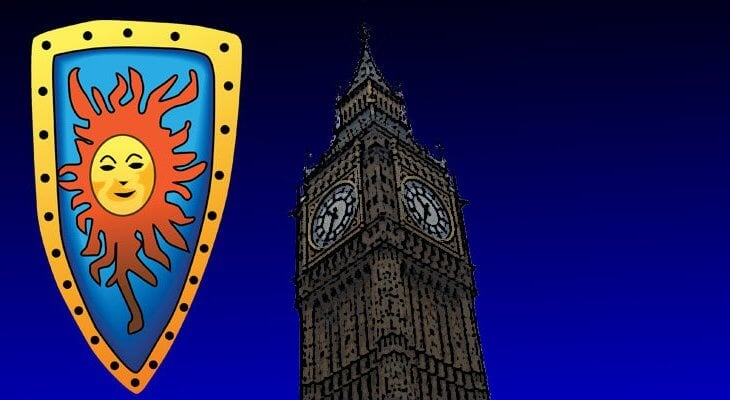UK: The Issue With The New Ban On Gambling Ads With “Strong Appeal to Children”
By Alex Smith, Last updated Mar 23, 2024

On October 1st, 2022, new, harsh gambling advertising rules came into force in the UK to build more robust protections for under-18s. The rules were first announced in April, and the UK Gambling Commission, working with the ASA and the CAP, has revealed they will consider complaints about the content of gambling and lottery ads. This will ensure that any adverts by online and offline gambling companies do not appeal to children and young people.
While it’s clear gambling adverts should not be developed to appeal to children, there are several significant flaws with the new regulations – and operators are, as they so often are in the UK, not put in a tough spot. Today, we will explore what these new regulations mean – and examine why they’ve attracted criticism.
An Introduction To The New CAP Content Gambling Restrictions
Under the new law, advertisers and online casinos must ensure that their advertising campaigns do not directly or indirectly target minors. While strict rules against advertising to children have been in place for many years, the new rules are a LOT stricter. There are now much harsher protections, including “strong” appeal tests – which ban using a wide variety of content, imagery, characters, and themes that are “likely to appeal to people under 18 regardless of how adults view this content.”

$ 35 for USD /CAD
No Maximum
40 x
No code required
–
–
Yes
Get $9,750 in free bets with Casino Max’s amazing welcome offer. 325% match for your 1st, 2nd and 3rd deposits.
Crypto Deposit: $10+ for a 350% bonus
All Deposits: $35+ for a 325% bonus
Wagering: 40x
– Total Maximum Bet is $10
– Bonuses will automatically be removed at the point of requesting a withdrawal

$10; $20 if depositing via BTC
N/A
20x (deposit+bonus)
–
–
$110
Yes
The ASA believes these new rules will significantly affect gambling advertisers who have previously worked with celebrities, footballers, and social media influencers to promote their brands. The ASA states that these celebrities are usually more commonly followed and recognizable to those under 18.
We will look at the specifics of the new rules in just a moment. However, to give you a brief overview, some of the new rules include bans on ads containing:
- Topflight footballers and footballers with a considerable following among under-18 on social media.
- All sportspeople who are well-known to under-18s, including those with a considerable volume of under-18 followers on social media.
- References to video game content and gameplay popular with under-18s.
- Stars from reality shows popular with under-18s, such as Love Island.
A Brief Background On The CAP And The ASA
The Committee of Advertising Practice (CAP) and the Advertising Standards Authority (ASA) are two organizations in the UK responsible for regulating and enforcing advertising standards. This ensures advertisements are legal, decent, honest, and truthful. Together, they work with the UKGC and the UK Government to set and enforce rules on how offline and online gambling can be advertised.
About the CAP
The CAP is an industry body that creates and maintains the UK Code of Non-broadcast Advertising and Direct & Promotional Marketing (CAP Code), which sets out the rules that advertisers must follow.
The CAP provides guidance, support, and resources to help businesses comply with the CAP Code and maintain ethical advertising practices. It also advises and trains advertisers and agencies, ensuring they know the latest rules and guidelines.
About The ASA
The ASA, conversely, is an independent regulatory organization that enforces the rules outlined in the CAP Code and the UK Code of Broadcast Advertising (BCAP Code).
The ASA investigates and adjudicates complaints from the public about potentially misleading, harmful, or offensive advertisements across all media channels, including print, online, and broadcast. In cases where ads are found to be in breach of the codes, the ASA can take various actions, such as requiring the ad to be withdrawn, amended, or subject to a scheduling restriction.
Children In The UK And Gambling: What Do The Stats Say?
Every year, the UKGC conducts research throughout the UK with teenagers aged 11-16 to get an insight into the number of people who gamble. In fairness, underage gambling in the UK is a significant problem.
The latest study shows 55,000 young people (between 11 and 16) have gambling problems. Experts predict a further 85,000 unaccounted cases also exist. The most recent stats can be shown below:
- 31% of young people aged 11 to 16 spent their own money on gambling in the past year
- 23% spent their own money on regulated forms of gambling
- 78% spent their money on gambling as they regarded it as a fun thing to do
- 12% have played an online gambling-style game. Nearly half played the game via an app
- 52% have heard of in-game items, and 44% of those paid money to open ‘loot boxes’ (mystery prizes) to get them
- 11% said that gambling by a family member had helped to pay for things at home, for example, holidays, trips, or clubs.
- 50% said someone had spoken to them about the problems gambling can lead to
These are, without a doubt, worrying statistics – and it’s clear the government and the UKGC need to do more to tackle underage gambling. But are these new advertising bans going to be enough?
The Gambling Ad Rules: No Imagery or References That Could Appeal To Children Allowed
As you can imagine, the new rules have already significantly affected gambling advertisers. Many online casinos rely on using athletes and celebrities to promote their brands! The reality of these new regulations is that brands will be severely restricted in terms of what images and references they can use in their ads. To make matters worse, there isn’t any definitive guidance on what is and isn’t allowed.
Below, we’ll look at a few of the leading restrictions advertisers will now face when running ad campaigns.
Ban On Footballers and Sportspeople “Well-Known to Under-18s”
“No more top-flight footballers or other high-profile sports people promoting the latest odds,” is what Shahriar Coupal, the director of the CAP, said when discussing the new rules brought in last year.
This includes UK footballers and managers associated with high-level clubs and national teams or participating in major tournaments, like the World Cup and the Champion’s League.
This also includes non-UK “star” football players at leading European clubs and other high-profile athletes from sports like cricket, tennis, and rugby who are “well-known.”
Activities with an “inherently strong appeal” to those under 18 might consist of betting ads related to football, eSports popular among minors, and prominent events in other sports.
However, the ASA Guidance outlines certain exemptions to the “strong appeal” rule. For example, the rules don’t apply when the ad’s audience is conducted in a way that excludes those under 18s seeing them. However, the burden of proof is on the advertiser, which will cause problems.
Naturally, implementing these rules poses a challenge. The biggest one, for many brands, will be determining which sports figures have an inherently strong appeal to under-18s. To many people, this is pretty subjective.
Moreover, athletes’ popularity can vary over time and across different age groups, further complicating the identification of those who should be restricted from appearing in gambling ads targeted at younger audiences.
References To Video Game Content Popular With Under-18s
This new rule is particularly vague – and it’s hard for us to wrap our heads around it. The official guidance from the CAP and the ASA states:
“Video games and online gaming are very popular with under-18s as a general activity. Online gambling and lotteries games are likely to be considered of inherent ‘strong’ appeal to under-18s if:
- They share significant similarities, in terms of form and gameplay, with video games, online games, or social games popular with under-18s; or
- In-game themes and content are likely to be considered of ‘strong’ appeal under the relevant provisions of this guidance (for instance, an online game with themes like ‘cute’ animal characters in a fairy tale world or a subject like a football).
eSports is another subject of ‘strong’ appeal because video gaming is very popular with under-18s, both in terms of the underlying activity of playing video games (on devices like phones and gaming systems) and many individual games that are popular in eSports competitions.”
The guidelines state that “strong appeal” in video gaming refers to cartoons or characters from video games – or characters with an affinity to popular video games – and even things like music and sound effects are mentioned.
This is murky territory – and if we’re honest, most kids don’t even think about playing a slot machine; they’re interested in Fortnite, World of Warcraft, etc. For example, if online casinos offered a Fortnite video slot, we’d understand – but this rule seems crazy and far too heavy-handed.
Stars From Reality TV Shows Popular With Under-18s
This rule makes slightly more sense, at least. Again, Coupal stated: “No more social media influencers, TV stars, or other celebrities popular with children inviting us to bet on red.”
The specific guidance states: “Sports people, celebrities and social media influencers who are ‘likely to be of strong appeal to children or young persons, especially by reflecting or being associated with youth culture’ will be banned from gambling and lottery adverts.”
It’s fair to say that many stars from shows like Love Island do have vast followings of under-18-year-olds, so we can’t disagree with this particular rule – although, again, it’s hard to pinpoint exactly what constitutes a reality show popular with under-18s.
The only guidance offered is: “A reality TV personality little known among younger children but who has significant appeal to adolescents evidenced by their social media presence and the popularity of the TV program they are involved in.”
Again, it’s too vague – and unless the ASA and the CAP can give concrete examples of which reality TV stars can – and can’t – be used in adverts, advertisers will be continually testing the waters each time they advertise with a celebrity.
“Child-Like” Games Prohibited From Being Shown Pre-Verification
While not explicitly mentioned in the new guidelines, all UK online casinos have removed games that could be seen as having child-like themes until users have completed a KYC check. Notable names include Jack and the Beanstalk from Netent, and Flurry Favorites, from Eyecon.
This particular issue stems back to 2019 when the ASA banned two ads 32Red Casino pushed out for “appealing to children.” The ASA stated that the ads breached the current rules because Jack and the Beanstalk was a top-rated children’s fairytale – and there was a significant chance children would come across these ads.
Interestingly, 32Red had already blocked unverified users from seeing the game, which was classified as high-risk. They stated that the adverts had been pushed out in error and were removed as soon as it was brought to their attention.
However, the watchdog wasn’t convinced, stating that because 32Red Casino had failed to “specifically and carefully target” their ads, they had been directed toward children. They said:
“The ads must not appear again in the form complained of. We told 32Red Ltd to ensure their gambling ads did not have particular appeal to those aged under 18 years of age and were not directed at those aged below 18 years of age.”
Kindred – the owner of 32Red Casino – responded, “We take a lot of care to ensure that games like this, which could appeal to under-18s, are not seen by people below that age.
“On this occasion, an error meant that it could be seen on a third-party website for a short period. We put this right as soon as we were alerted to it. We regret this happened and have taken steps to ensure this does not happen again. 32Red takes its responsibilities extremely seriously.”
Why The New Rules Were Brought In: Some Valid Reasons
The CAP conducted a research study in conjunction with GambleAware in 2020 to examine gambling adverts’ impact on the British public. The initial report stated:
“The GambleAware Report finds that exposure to gambling advertising is high across all age groups, and restrictions on the scheduling, placement, and targeting of gambling advertisements have a limited impact. This includes the ‘25% test’ restriction, through which CAP ensures non-broadcast ads for gambling, alcohol, and other age-restricted ads served to mixed-age audiences are prohibited where more than 25% of the audience is under 18.
The Final Synthesis Report contends that light exposure to gambling advertising can impact attitudes towards the prevalence and acceptability of gambling and, in turn, “susceptibility” to gamble in the future. The report subsequently recommends reconsidering CAP’s ‘25% test’ restriction.”
However, in a unique twist, the CAP stated: “For reasons set out in this section, CAP considers the evidence on which this finding is based falls considerably short of suggesting that the rules need to be updated to further restrict the media in which, and the audience to which, gambling advertisements may be served.”
It was only in April 2022 that the decision was made that new rules were indeed needed.
Another factor behind the rules was that some game developers and online casinos used games with child-like imagery and themes. Take a look at this thread, and you’ll see that both games are pretty clearly designed in a way that could appeal to children.
Reasons Why The New Rules Are Problematic
The CAP and ASA’s new rules have caused panic in the industry. Many believe there are legitimate criticisms of many of the new rules.
One of the most significant issues is the lack of clear guidelines. In our opinion, this could lead to confusion and problems enforcing the new rules. How do you prove a sportsman has a “strong appeal” to under-18s? Naturally, advertisers will be much more careful, limiting their creative abilities.
There are also worries that the regulations need to be more practical. Many critics claim they overlook “common sense” in general. Below, we will look at some main problems in more depth and explain why they’re problematic for the gambling industry.
Too Much Guesswork For Casinos – Rules Are Not Clear Enough
The new rules rely heavily on guesswork in determining which public figures can be included in ad campaigns. For instance, the rules state that ads cannot feature footballers with a well-known following of under-18-year-olds. As we just noted, who on earth can decide this?
Sure, social media metrics might provide some clues, but these figures will always change. We also agree that there just isn’t a threshold for a “well-known following.” This will leave marketers unclear about which athletes to avoid featuring in their ads.
Harder For Casinos To Advertise
The new CAP and ASA regulations create significant challenges for casinos attempting to advertise their services. By restricting the use of specific sports figures, celebrities, and influencers, casinos are left with even fewer ways of promoting their brand and attracting new customers.
The beauty of ad campaigns is that it allows brands to create engaging and relatable content that captures the attention of their target audience. With the new rules, however, casinos will need help to differentiate themselves in a competitive market, costing them more money – time – and potentially causing them to lose money.
The fear of penalties or reputational damage will also affect casinos, and we’ll probably see them begin to take a MUCH more conservative approach towards advertising. Again, this will lessen their creative abilities – directly impacting the casino industry’s growth and success!
Increase In Unregulated Activity
Implementing these new rules may also inadvertently lead to increased unregulated activity. As licensed casinos find it harder to advertise legally, there is a real risk that players will turn to unlicensed operators who aren’t bound by the UK’s strict rules.
These unregulated platforms often lack an online gambling license, may promote irresponsible gambling behavior, and some even offer fake/pirated games.
This is already a problem we’ve been seeing in the last few years; ever since the UKGC brought in their draconian Source of Wealth (SOW) checks and pre-deposit verification checks, players have been flocking to offshore-licensed and crypto casinos. The same may be the case now, especially if players can no longer play games they enjoy.
Loopholes In The Restrictions
Furthermore, the new rules may contain potential loopholes that savvy marketers could exploit. For instance, advertisers might circumvent the restrictions by using lesser-known athletes who still have a strong underage following but do not meet the vague criteria of being “well-known.”
Additionally, casinos could employ indirect advertising techniques, such as using user-generated content or partnering with social media influencers who do not fall under the regulation’s specific guidelines.
While it’s pretty unlikely we’ll see this due to the potential for huge fines, it’s something some of the smaller, newer casinos may try – and it remains to be seen how the ASA and the CAP will respond to it if and when it occurs.
Potentially Limited Impact on Problem Gambling in Children
Despite the good intentions behind the new CAP and ASA rules, their impact on limiting children’s exposure to gambling advertisements and subsequent urges to gamble might be limited. In 2023, it’s harder than ever to “filter” what kids see – no matter how hard you try.
While the regulations target specific figures, such as top-flight footballers and reality TV stars, they do not address gambling advertising on social media platforms, forums, and websites that are easily accessible to those under 18. More kids than ever have access to a smartphone, and apps like TikTok are, in a sense, unregulated!
We were also surprised that the regulations don’t deal with the presence of gambling sponsorships in sports. It’s common to tune into a football match and see gambling websites on players’ shirts and stadium LED screens – even on the pitch itself!
However, a discussion around banning gambling companies from sponsoring sports teams is already underway, and we’ll likely see this become a reality within the next year or two.
In reality, the rules may not effectively deter children who are already interested in gambling or are already addicted. These children might actively seek out gambling-related content, bypassing the measures put in place by the new regulations.

$ 35 for USD /CAD
No Maximum
40 x
No code required
–
–
Yes
Get $9,750 in free bets with Casino Max’s amazing welcome offer. 325% match for your 1st, 2nd and 3rd deposits.
Crypto Deposit: $10+ for a 350% bonus
All Deposits: $35+ for a 325% bonus
Wagering: 40x
– Total Maximum Bet is $10
– Bonuses will automatically be removed at the point of requesting a withdrawal

$10; $20 if depositing via BTC
N/A
20x (deposit+bonus)
–
–
$110
Yes
Casinomeister’s Final Thoughts
Everyone agrees that underage gambling in the UK is a significant issue. We also agree that more needs to be done to protect kids and vulnerable young adults from becoming exposed and addicted to gambling.
While the new CAP and ASA rules are well-intended and aimed at reducing children’s exposure to gambling advertisements, we think their impact will be minor. This is due to the complex nature of the issue itself – and the very unclear guidelines released to advertisers.
Instead, regulators should look at other ways of tackling underage gambling in the UK. This could include teaching responsible gambling in schools and creating early intervention initiatives to help kids who are already gambling.
We also believe there’s a strong argument for limiting gambling sponsorships in sports. In our opinion, this is MUCH more visible to those under 18 than ads online. However, as we already noted, this is currently being looked into, and we’re confident the rules around this will change soon.
While the new CAP and ASA rules may be a step in the right direction, we think they may end up negatively impacting the industry while doing little to nothing to help kids and young adults.
Interesting Articles You Could Take a Look
All you need to know about Curaçao Gambling Licenses
A Curacao license is one of the most common online gambling licenses that you’ll find used by online casinos, and there’s a number of reasons why so many online casinos and online gambling operators – some of which we’ll be taking a look at on this page.
What Happened To Ayezee?
Ayezee, once a popular figure in the casino streaming community, was at the centre of a storm of controversy a couple of years ago. Previously known for his fast-paced, action-packed and engaging “real casino” streams, questions started to arise from his large following of viewers due to his near-endless winning streaks. Sure enough, allegations started to surface that Ayezee was not playing fair.
Gamstop Remove Exclusion
The Gamstop self-exclusion scheme was revolutionary in the UK, allowing players to automatically self-exclude themselves from all UK-licensed online casinos and betting sites from one centralized portal.
Where is Bovada Based Out Of?
So, is Bovada legal? Do they offer legal sports betting? Can their casino games be played by US players? And where are they based? Let’s find out!
What Does BFCB on a Bank Statement Mean?
On this page, we will be looking at why some people have found BFCB on their bank statements – and what the account holder can (and should) do if they find these transactions on their account.



 Top 5 casinos
Top 5 casinos 

